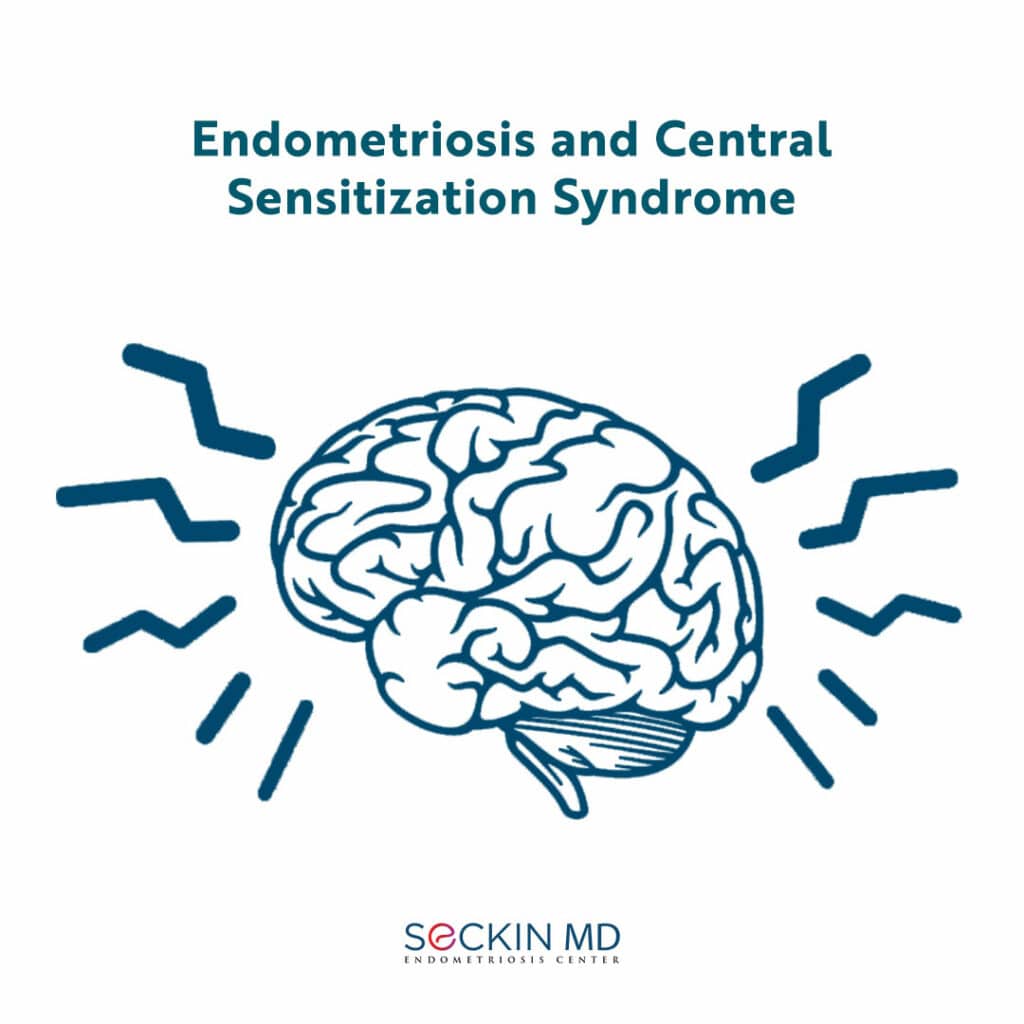Endo and Central Sensitization Syndrome

Nociception or the process of feeling pain is a protective method by which the body prevents further injury from noxious (harmful) stimuli by withdrawing itself from it. Central sensitization refers to the phenomenon of experiencing excess pain due to enhanced stimulation of pain pathways in the brain and can occur in patients with endometriosis.
What is peripheral pain?
There are two main types of peripheral pain: nociceptive pain and neuropathic pain. Nociceptive pain refers to pain due to common stimuli such as temperature or physical injury. The spinal cord relays the sensation from the site of injury to the brain. Non-steroidal anti-inflammatory drugs (NSAIDs) such as acetaminophen, ibuprofen, and opioids can reduce nociceptive pain.
Neuropathic pain occurs when there is damage or compression to a specific nerve. Unlike the sensation of aching in nociceptive pain, neuropathic pain is in the form of tingling, burning, and shocks that can radiate to areas away from the site of nerve damage. NSAIDs do not reduce neuropathic pain and the use of drugs like gabapentin is necessary. Sometimes, anesthesia, physical therapy, or even surgery may be necessary.
How is centralized pain different from peripheral pain?
While peripheral pain originates outside the brain and spinal cord, centralized pain occurs in the brain itself. The brain does not have any pain receptors of its own. But it can at times amplify the pain signals that it receives.
Central sensitization syndrome happens when there is an alteration in how the brain perceives pain. This can increase pain intensity and complicate matters regarding pain management.
How is endometriosis related to central sensitization?
Chronic pelvic pain is one of the hallmark symptoms of endometriosis. Women with endometriosis experience varying degrees of non-specific pain from mild to killer cramps. In cases of deep endometriosis, the pain is often accompanied by severe symptoms such as painful intercourse and painful bowel movements.
Research shows that chronic pelvic pain associated with endometriosis can be related to central sensitization syndrome leading to overall reduced quality of life and a higher risk of anxiety and depression.
Although laparoscopic deep excision surgery is the gold standard for the treatment of endometriosis, chronic pelvic pain can still persist after surgery in a small set of people. Researchers believe that central sensitization syndrome could be the culprit. Central sensitization can also lead to patients having low pain thresholds due to hypersensitivity to pain stimuli.
How is central sensitization evaluated in endometriosis?
The central sensitization inventory is a self-reported questionnaire that can help correlate pain outcomes with central sensitization syndrome. The questionnaire can differentiate between centralized and non-centralized pain.
Researchers note that a central sensitization inventory score greater than 40 can help identify endometriosis patients whose post-operative pain could be a result of central sensitization.
How can central sensitization be managed?
For the maximum possible symptom relief, deep excision of all endometrial lesions is of great importance. Completing a central sensitization inventory can give you an estimate of any pain you may experience post-surgery. A doctor who understands endometriosis can help you navigate these results.
Techniques such as mindfulness or recreational therapy or alternative medicine such as acupuncture as well as switching to an anti-inflammatory diet can all help manage post-operative pain.
Do you still have pain after endometriosis surgery? Please share your experience by leaving a comment on our post on Facebook or Instagram.
Get a Second Opinion
Our endometriosis specialists are dedicated to providing patients with expert care. Whether you have been diagnosed or are looking to find a doctor, they are ready to help.Our office is located on 872 Fifth Avenue New York, NY 10065.
You may call us at (646) 960-3080 or have your case reviewed by clicking here.